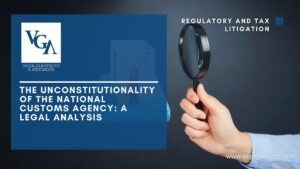Standard of review established by the Supreme Court.
As we discussed in the previous article titled Constitutional Protection of Arbitration in Mexico, the First Chamber of the Supreme Court of Justice analyzed, in the judgment of the direct appeal 71/2014, the new paradigm of constitutional protection that covers Arbitration as an alternative dispute resolution method, thus establishing the active duty of the authorities regarding the freedom of the parties to enter into an arbitration procedure, since such freedom must be promoted, respected, protected and guaranteed by all Mexican authorities.
Now then, in accordance with this constitutional protection, in said judgment, the First Chamber also considers it necessary to establish the nature of the interpretative exercise that the judicial authority must carry out to evaluate whether the grounds for nullity outlined in Article 1457 section I of the Commercial Code are present in a particular case. This takes into consideration that Article 1432 also provides for the power of the arbitral tribunal to decide on its jurisdiction, including the exceptions regarding the existence or validity of the arbitration agreement.
Regarding the nullity of an arbitration agreement, the applicable legislation (Code of Commerce) only provides for this action to proceed, in accordance with section one, in 4 cases, of which paragraphs c) and d) refer to the analysis to be made by the competent judge regarding the arbitration agreement and in simple terms if: i) the terms of the arbitration agreement are exceeded or ii) the arbitration procedure was conducted in accordance with the terms agreed upon by the parties.
The First Chamber deemed it necessary that to determine whether the grounds for nullity invoked are present, the judicial authority must engage in the interpretation of the terms of the arbitration clause, which implies reviewing the interpretation made by the arbitral tribunal at the time of ruling on its jurisdiction, however, this does not imply that the judicial authority must proceed to substitute itself in the judgment of the arbitral tribunal.
Therefore, the judicial authority must carry out an evaluation that in general terms constitutes a review, that is, as a general rule, an evaluation of the regularity of the interpretation carried out by the arbitral tribunal, and under Article 1432 of the Code of Commerce, when reviewing the award, it must be assumed that the arbitral tribunal has ruled on its jurisdiction.
In this regard, the First Chamber established that not all judicial reviews should be subject to the same standards since in some cases a very strict standard with respect to competencies that contemplate a high degree of discretion would imply an unnecessary interference in the power of legal production, and in the case of being too lenient in competencies and with little margin of appreciation, the judicial control over such acts would be diminished.
Thus, the severity of judicial control is inversely related to the degree of freedom of the authors of the law, and therefore, when the Constitution establishes a degree of discretion in certain topics, this means that the possibilities of interference by the constitutional judge are more limited and, therefore, the intensity of its control becomes limited.
This becomes particularly important when determining the precise scope of judicial scrutiny that judges must apply when reviewing the interpretation of arbitral tribunals regarding arbitration agreements, to avoid establishing an overly intrusive scrutiny, which implies the substitution of the judicial authority’s criteria over the one established by the arbitrators, since, unless otherwise agreed, the arbitrators must decide on their own competence and must decide based on the provisions of the agreement and take into consideration the commercial practices applicable to the case. Consequently, when analyzing the validity of an arbitration award, the judges must restrain themselves and not submit to scrutiny the interpretative decisions of the arbitrators under the same scope with which a lower judicial instance is reviewed.
Taking this analysis as a basis, the Supreme Court of Justice considered that the correct standard of review is a reasonable interpretative method, which implies taking the text of the arbitration agreement as a baseline:
- 1. When the language is clear and, therefore the normative solution is easy to determine, the judge must apply it, notwithstanding what was resolved by the arbitral tribunal.
- When the language is ambiguous or vague, in other words, subject to interpretation, the judge must limit to verifying whether the interpretation of the arbitral tribunal is reasonable and only declare the award invalid if the determination on which the jurisdiction is based is capricious or arbitrary.
This analysis leads the court to conclude that a mere interpretative disagreement between equally reasonable methods is not a basis for a judge to determine the invalidity of an arbitral award, but that in case of ambiguity in the arbitration agreement, the judge must consider as preferential the interpretation of the arbitral tribunal and only regulate the reasonableness of its analysis.




